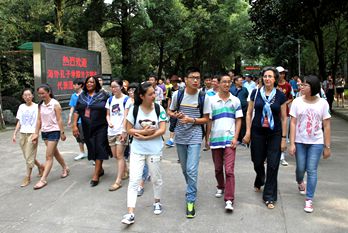Optimized visa policy offers more convenience

Foreigners at Beijing Daxing International Airport. [Photo/VCG]
Visa: Multiple-entry application process made simpler
The National Immigration Administration announced on Thursday five optimized visa measures to facilitate the entry of foreign nationals into China for business, education and tourism purposes, including one that said foreigners who need to visit China urgently can apply for a port visa on arrival.
The new measures, effective immediately, say foreigners who need to come to China urgently for nondiplomatic or nonofficial purposes, such as business cooperation, investment, exchanges and family reunions, can apply for a port visa on arrival with supporting documents like an invitation letter. The rule also applies to those who are unable to obtain a visa overseas in time.
Foreigners will enjoy 24-hour visa-free transit through nine major airports in China, including the two in Beijing, Shanghai Pudong International Airport, Guangzhou Baiyun International Airport and Shenzhen Bao'an International Airport.
At a news conference held by the State Council Information Office, Chi Jingyang, director of the NIA's border inspection and administration department, said that transit passengers at these nine international airports can bypass border inspection procedures if their connecting flight to any third country or region is scheduled within 24 hours.
However, if such passengers plan to leave the designated port area during transit, they will have to apply for a temporary entry permit, Chi said.
Foreigners planning short-term stays in China for nondiplomatic or nonofficial purposes can apply for visa extensions, reissuing of visa or its replacement at any entry and exit authority nearby, provided they have valid reasons to continue staying in China.
Multiple-entry visas are available for foreigners in need, and they can apply to any entry and exit authority by providing relevant proof, such as an invitation letter, according to the NIA.
Furthermore, the documentation required for foreign visa applicants in China has been simplified. For instance, there is no need to provide printed paper proof if applicants have verifiable records of their accommodations and business licenses.
Liu Haitao, deputy head of the NIA, said these new measures aim to promote smooth cross-border mobility for people from various countries, fostering a more liberalized and convenient environment for international investment and trade, in order to better facilitate global economic recovery.
NIA officials revealed that China welcomed 210 million inbound visits in 2023, about 62.9 percent of the number recorded in 2019 before the COVID-19 pandemic.
Chi, from the border inspection and administration department, said he anticipated a continued growth in the number of inbound travelers in 2024, which will coincide with further global economic and trade development, the resumption of international flights and the gradual increase in cross-border personnel movement.
"The NIA is fully committed to serving and facilitating exchanges and interactions between Chinese and foreign individuals," he added.

 City brand logo - fist-and-palm salute
City brand logo - fist-and-palm salute Confucianism on campus
Confucianism on campus The culture of the academy
The culture of the academy